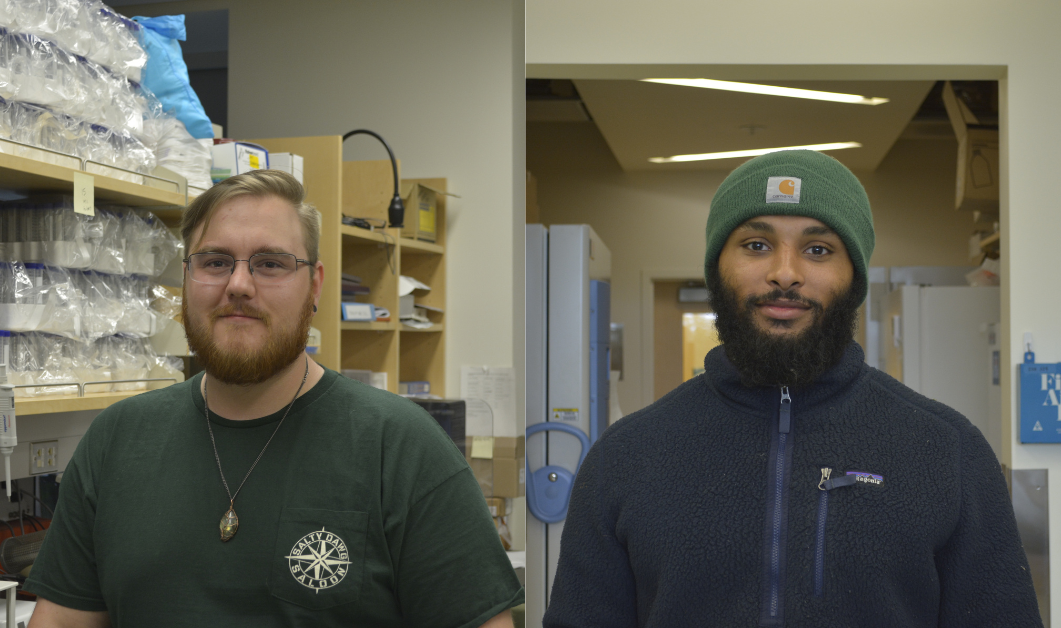Student Spotlight: Taylor Thompson and Kendall Scott
Biological Sciences students Taylor Thompson and Kendell Scott are working on a summer research project with Biological Sciences Associate Professor Brandon Briggs. Working with the Department of Environmental Conservation (DEC), the research project focuses on shipping drinking water samples across Alaska.
When asked about the research project, Dr. Briggs described the main purpose as:
“We want our drinking water to be clean, as in we don’t want to have any bad microbes in it. One of the things that the state does to ensure this is that they go through and test all of the drinking water for different bacteria, including bad bacteria. The Environmental Protection Agency states that all drinking water has to be tested within 30 hours of being sampled. Unfortunately, there are a lot of rural places in Alaska where shipping the sample to the state lab in Anchorage takes more than 30 hours. What we are trying to determine is if the bacteria that we are testing for actually do go away within those 30 hours, or if we have closer to 40 hours or even 72 hours before we have to start worrying if we are going to be able to detect it. Our team is running tests to either confirm or deny this 30-hour variance, and provide information on if there is a significant die off of the bacteria over 48 hours."

(Talyor Thompson- left; Kendall Scott- right)
Biological Sciences students Taylor Thompson and Kendell Scott sat down with us to discuss this research, how they got involved, and its impact on the greater Alaskan communities.
Dr. Briggs detailed the research itself; however, can you tell me a little bit about how you each got involved with this project?
Thompson: I was actually taking a biology class and one of the TA’s for the class works in this lab. After class one day, they asked me if I wanted to help out with an experiment because Dr. Briggs was looking for students to help and I ended up here. It is very exciting! I have worked in safety and OSHA related stuff, and I also worked in EPA-adjacent jobs, so I have been on the alternate end of this type of work, where I was the one taking the samples.
Scott: I have always wanted to do research. I actually took Dr. Briggs’ Bioinformatics class and I asked about research opportunities! I was trying to get involved, and as I am sure you can guess, it was really hard because COVID hit and there were occupancy limits for labs. Dr. Briggs’ told me that he had this research opportunity, and I jumped on it.
Why this project? What about the opportunity interests you both?
Scott: I really think the research and the opportunity is pretty cool because of the implications of the research. If you look at indigenous places in Alaska, which are oftentimes underrepresented, this research impacts those communities. I think it’s really cool, because science helps people. It impacts the community! It is also great, because your whole time as an undergraduate, you are reading textbooks, studying theory, and taking exams. But with research like this? You can start to apply what you are learning while you're helping others.
Thompson: I am pursuing my Bachelor of Science in Biology right now, and this is ultimately a foot in the door for things like graduate school and that’s exciting. I transferred into UAA, and due to all of my transfer credits, I am classified as a senior but I still have a lot to do at UAA. I am trying to get ready for grad school because it is a lot closer than I think it is, and this is a great opportunity to get there.
How is this research, and its findings, going to impact the community?
Thompson: For greater Alaska, this research and its implications? It is going to save a lot of money. A lot of the remote villages and hard to access places in Alaska, if they have a larger time frame to send out samples, it is going to save money and ultimately be less of a hassle for greater Alaska. It will also allow the DEC to continue to perform their sampling the way they have been with that variance.
Scott: Everyone has to drink water, regardless of their location. This research is making sure that the water is as clean as possible. For us to be able to test that drinking water and ensure that the results are actually showing what they should show? It saves time and money, and also helps the greater Alaskan communities.
Thank you Dr. Briggs, Kendall, and Taylor for your hard work, and keep up the good work!









